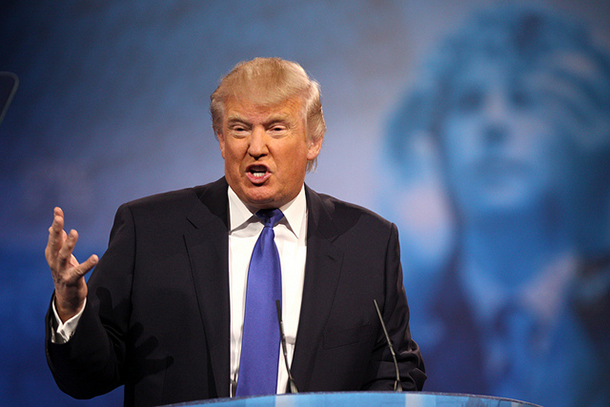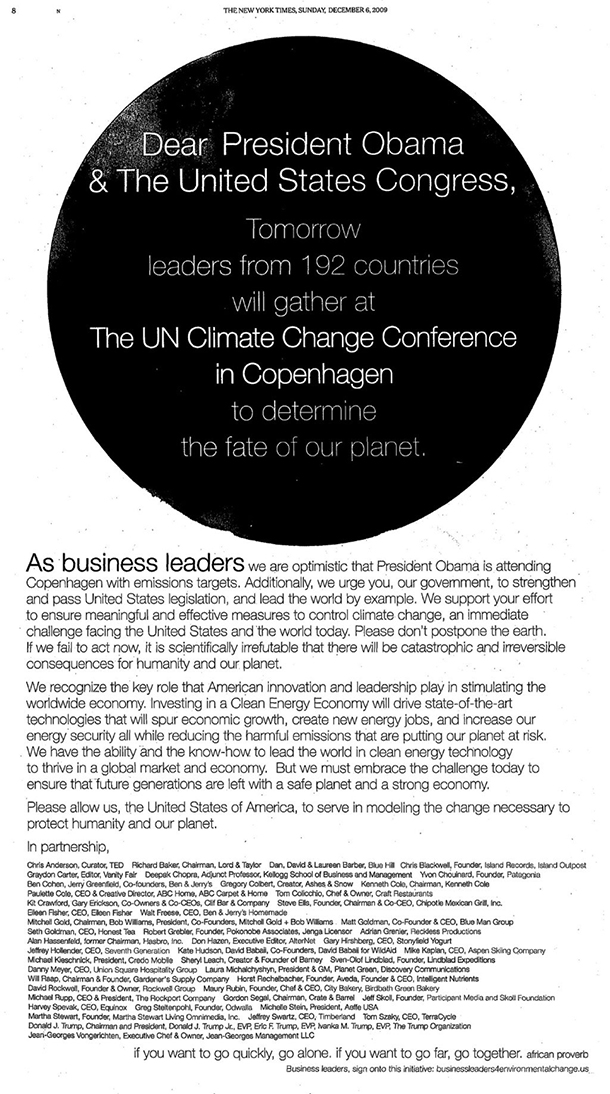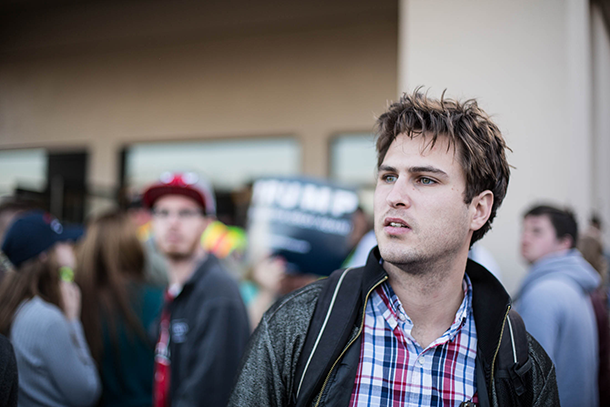Trump on Climate
Air Date: Week of October 7, 2016

The Republican nominee for President, Donald J. Trump, has tweeted, "the concept of global warming was created by and for the Chinese in order to make U.S. manufacturing non-competitive". (Photo: Gage Skidmore, Flickr CC BY-SA 2.0)
The comments of Republican Presidential nominee Donald Trump on global warming demonstrate inconsistency and his campaign has been unwilling to discuss with Living on Earth his stands on environment and energy issues. Host Steve Curwood compares various statements of Mr. Trump and his running mate Gov. Pence, and talks with Politico Reporter Ben Schreckinger about the campaign.
Transcript
CURWOOD: From the Jennifer and Ted Stanley Studios at the University of Massachusetts Boston and PRI, this is Living on Earth. I’m Steve Curwood. As the US national elections draw near, we’re taking a look at the environmental records and plans of the presidential candidates. Today we’re examining the beliefs and ideas of the Republican presidential nominee, Donald J Trump and his running mate, Indiana Governor Mike Pence, and they don’t always seem to agree. To get a clearer picture we requested interviews with Mr. Trump and Governor Pence, which were denied by Trump press secretary Hope Hicks. And the Trump ticket did not offer any surrogates. So we approached Myron Ebell, long a prominent denier of the human role in climate change, whom the Trump campaign has reportedly designated as the transition team point person regarding the Environmental Protection Agency. He declined to speak with us as well, referring us back to the campaign, so we decided to look at the record. On September 27th, Vice Presidential candidate Mike Pence was a guest on Chris Cuomo’s “New Day,” a CNN cable news program, where he said,
PENCE: There's no question that the activities that take place in this country and in countries around the world have some impact on the environment and some impact on climate.
CURWOOD: The internet and press commentary blew up, noting that the candidates are not on the same climate change page. This was a flip for Governor Pence. He’s called climate change “a myth” in the past, and it’s especially surprising when you consider what campaign manager KellyAnne Conway said of Mr. Trump’s beliefs right before on another CNN program.
CONWAY: He believes that global warming is naturally occurring.
REPORTER: Is what...naturally?
CONWAY: That climate change is naturally occurring.
REPORTER: He believes in climate change.
CONWAY: That there are shifts that are naturally occurring.
REPORTER: Oh, he doesn’t believe it’s manmade.
CONWAY: Correct.
CURWOOD: This is a claim Donald Trump himself has repeated on national television.
TRUMP: Well, I’m not a big believer in man-made climate change. It could be some impact, but I don’t believe it’s a devastating impact.
CURWOOD: Oh, and by the way, not only is there inconsistency between Governor Pence and Mr. Trump, Trump and Trump don’t always agree on his climate change statements either. This is from the first presidential debate on September 26th.
HILLARY: Some country is going to be the clean energy superpower of the 21st century. Donald thinks that climate change is a hoax perpetrated by the Chinese. I think it’s real.
TRUMP: I did not...I do not say that. I do not say that.
CURWOOD: In his Tweets, Mr. Trump notes, for example, “Snowing in Texas and Louisiana, record-setting freezing temperatures throughout the country and beyond. Global warming is an expensive hoax!”

As Governor of Indiana, Vice Presidential Nominee Mike Pence wrote that climate change is a “myth”, a statement he countered in a CNN interview September 27 stating that humans do have some impact on the climate. (Photo: YouTube screenshot)
CURWOOD: We could not find mention of climate issues on the Trump campaign website, but it does offer an "America First" energy platform that pledges to "make America energy independent, create millions of new jobs, protect clean air and clean water, and conserve our natural habitats, reserves and resources". But it offers no details as to how that would all be accomplished. Mr. Trump has been critical of President Obama’s decision to halt the Keystone XL pipeline and blames the President for “killing the coal industry”. Mr. Trump also wants to cancel the Paris Climate agreement and rescind Obama’s Clean Power Plan.
For more insight we turn now Ben Schreckinger of Politico, who last May told Living on Earth how Mr. Trump had cited the risk of rising sea levels due to climate change, in seeking permission to build a wall for a seaside golf course in Ireland.
Hi Ben, welcome back.
SCHRECKINGER: Hey, glad to be here, thanks for having me back.
CURWOOD: Great to have you back on the show, and of course, both of us have gotten thrown out of Trump rallies, or rather admitted. I think they didn't like your reporting and they invited me, but then when I got to the door, suddenly my name wasn't on the list.
SCHRECKINGER: The Trump campaign has gone further than any American political campaign at a high level in memory, in terms of alienating the press, targeting the press, seeking to block access of the press to its events. As a working journalist, you never want to see that, and so, you know, as someone who’s shared that experience of being kicked out by the campaign, I wouldn't take it personally.
CURWOOD: So tell me, why is the Trump campaign so apparently uncomfortable speaking their views on climate change with the media?
SCHRECKINGER: This is a pattern we've seen on a number of issues with Donald Trump. There seems to be a desire to telegraph multiple, often contradictory messages, and one, you know, let people be confused and let people hear, I think, they're hoping what they want to hear. Donald Trump in the past has been one of the most prominent and outspoken climate change deniers in United States, trumps up public climate change denial, and what he's done in private with his businesses, it’s something that I think has never been fully addressed by the campaign. That was the subject the last time I came on your program.
Filing to a county council in Ireland to get a seawall built, Trump identified global warming and the associated increase in stormy weather as a reason to build the seawall, as a vital threat to his resort there. Obviously, there's the hypocrisy question there. Since then, it's also come out there was a full page ad that I think of the New York Times that ran a few years ago, of business leaders calling on the government to take more action on climate change. Trump's three adult children and Trump were all signatories to that, which sort of further muddles his position. It's possible that this was something that his kids took the lead on or a PR firm took the lead on, but it was totally, completely inconsistent with both its denials of climate change then and his position and the position of the people around him that it's really not for the government to take a major role in. There's just a lot of confusion here.

Grist reporters Ben Adler and Rebecca Leber uncovered a full-page ad in a December 2009 issue of the New York Times in which Donald Trump was one of the signatories calling for climate action. (Photo: New York Times)
CURWOOD: So, tell me, why has his vice presidential running mate Mike Pence changed his views from outright climate denial to a view that offers some concessions to the human impacts of climate science?
SCHRECKINGER: That's a real head-scratcher for me. Pence was a staunch ally of the coal industry, of the Koch Brothers. He remains opposed to the EPA's Clean Power Plan. He's been a climate change skeptic. In the past, recently after Trump's campaign manager Kelly Anne Conway said that Trump was skeptical that human activity was contributing to climate change, Pence went on television, I think the next day, and said that human activity does have some impact on the climate. As far as I know, that's the first time he said it, and it's really a bizarre time to change your position when you're contradicting the campaign manager of your presidential campaign. I don't know why he said that, especially when he said it.
CURWOOD: Well there've been a lot of head-scratching moments in this campaign, and I guess when it comes the climate that’s certainly one, isn’t it.
SCHRECKINGER: It’s clear that there's more conversation to be had, more questions to be asked of this campaign in terms of where exactly they stand on climate change and what exactly they think ought to be done with it.
CURWOOD: Well, as we record this on October 5th, there has yet to be any real pressing in the presidential debates, including the vice presidential debate on the climate matter from that hosts. So far we've seen Elaine Quijano and Lester Holt. So, they're not being asked about this.
SCHRECKINGER: And we know that it's an issue that policymakers, thought leaders are very concerned about. We know that the Pentagon views it as a top strategic threat to the United States because of the expectation that the disruptions caused by climate change are going to create national security issues going forward all around the world. We know that Americans increasingly in polls are saying it's something they are concerned about. We know it's a major issue for young people, for people my age, so you’ve got to hope that it's going to get some airtime at a debate.
CURWOOD: Ben, from your perspective, why do you think Mr. Trump's opponent, principal opponent, Secretary Clinton, hasn't pressed on the matter of environment in these debates, at least so far at the time we're recording this. For example, in the vice presidential debate, Tim Kaine, Senator Kaine, just mentioned the prospect of clean jobs and Pence only referred to the climate indirectly complaining about the "war on coal". Why is this so sotto voce? Why not a more vigorous debate?
SCHRECKINGER: Well, that's a good question, and Hillary Clinton is not doing as well as she would like to be with young people, not that they're flocking to Donald Trump, but in really significant numbers millennial voters are looking at Gary Johnson and to a lesser extent Jill Stein. It's possible she could win some points by pointing to her record on that, pointing to her positions on that. I think the reason that she had hasn't is that it's just not a priority. It seems that the priority in these debates is to question Trump's character, make it about his personal fitness for office, beat him into lashing out and, in general, politicians who think that climate change is important have struggled to make it a winning campaign issue, have struggled to demonstrate that there are votes to be had there.

Ben Schreckinger is a reporter with POLITICO (Photo: courtesy of M. Scotty Mahaskey)
CURWOOD: So, what does it do for a democracy with such pressing issues, say around the environment as climate disruption, to not allow the press in, do you think?
SCHRECKINGER: It's never good to be the limiting the access of reporters to a very high-stakes presidential campaign. That's just not the way our system works. Our system is based on protecting the press, empowering them to get as much information as possible about public figures, people who seek to become government officials, and I think that the position of almost any working journalist is going to be, “more transparency, the better,” and taking unprecedented steps in a presidential campaign to block press access is not a good thing for our political system.
CURWOOD: But who needs the press when you've got Twitter?
SCHRECKINGER: Platforms like Twitter do change the balance of influence between the organized press and the presidential campaign. It does erode the gatekeeper function. In some ways that's probably a good thing. It means that there is more direct communication between public figures and the public, more instantaneous communication.
At the same time, novel forms of communication can be exploited. We've seen on Twitter as well, the use of political bots at an unprecedented level for an American election as this sort of thing, these fake Twitter bots that spew propaganda had become common in Latin America, Russia, Syria, and now all of a sudden they're being used in the United States like we've never seen before.
CURWOOD: Ben Schreckinger is a reporter with Politico. Ben, thanks so much for taking the time with us today.
SCHRECKINGER: Yeah, thanks for having me, Steve. Any time.
Links
Donald Trump’s “America First” Energy Platform
Governor Mike Pence’s climate change comments
Trump says global warming is not human-caused
Campaign Manager Kellyanne Conway defends Trump
Living on Earth wants to hear from you!
Living on Earth
62 Calef Highway, Suite 212
Lee, NH 03861
Telephone: 617-287-4121
E-mail: comments@loe.org
Newsletter [Click here]
Donate to Living on Earth!
Living on Earth is an independent media program and relies entirely on contributions from listeners and institutions supporting public service. Please donate now to preserve an independent environmental voice.
NewsletterLiving on Earth offers a weekly delivery of the show's rundown to your mailbox. Sign up for our newsletter today!
 Sailors For The Sea: Be the change you want to sea.
Sailors For The Sea: Be the change you want to sea.
 The Grantham Foundation for the Protection of the Environment: Committed to protecting and improving the health of the global environment.
The Grantham Foundation for the Protection of the Environment: Committed to protecting and improving the health of the global environment.
 Contribute to Living on Earth and receive, as our gift to you, an archival print of one of Mark Seth Lender's extraordinary wildlife photographs. Follow the link to see Mark's current collection of photographs.
Contribute to Living on Earth and receive, as our gift to you, an archival print of one of Mark Seth Lender's extraordinary wildlife photographs. Follow the link to see Mark's current collection of photographs.
 Buy a signed copy of Mark Seth Lender's book Smeagull the Seagull & support Living on Earth
Buy a signed copy of Mark Seth Lender's book Smeagull the Seagull & support Living on Earth

